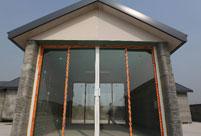 Cherry blossoms reach peak bloom in Washington D.C.
Cherry blossoms reach peak bloom in Washington D.C.
 Top Chinese fashion icons in foreigners' eyes
Top Chinese fashion icons in foreigners' eyes
 Asia's largest business aviation exhibition to be held in Shanghai
Asia's largest business aviation exhibition to be held in Shanghai
 World's top-rated luxury hotels
World's top-rated luxury hotels
 Wu Jing, Xie Nan to hold wedding on May
Wu Jing, Xie Nan to hold wedding on May
 London Cake International attracts tourists
London Cake International attracts tourists
 Let's dance in harmonic Shaanxi
Let's dance in harmonic Shaanxi
 Christie's to auction dazzling diamonds
Christie's to auction dazzling diamonds
 'Model husband' shatters image of love
'Model husband' shatters image of love
 Can animals smile? Or put on a happy face
Can animals smile? Or put on a happy face
Michael Mario Wosang, Managing Director of Nile Commercial Bank, introduced South Sudan’s investment policies, such as guarantees against expropriation, protection of Intellectual property laws, and dispute resolution. He also emphasized that the government is to encourage new banks, mobile banking, and a system of training and assistance for local entrepreneurs.
In recent years more than 100 Chinese enterprises have entered South Sudan. This includes major names like ZTE, Sinopec, Shandong High-Speed and other large-scale business. These companies have a wealth of investment experience in Africa, and they are optimistic about future developments in South Sudan.
Hu Xing, Managing Director, South Sudan Branch, Sales Division, ZTE Corporation, said to People’s Daily Online: “Chinese companies can negotiate with the South Sudan government on resources, and generally Chinese companies are made welcome. ZTE Corporation obtained a loan of 200 million euro from China Exim Bank to set up the Sudan Telecommunication Network, which popularized the use of mobile phones in South Sudan.”
But medium and small enterprises remain hesitant about business development in South Sudan. Mr. Liu, marketing manager of Solar One, believes that for his company investment in South Sudan presents many risks.
Liu Zhongjun, manager of a Chinese engineering firm, said that he remained wary of investment in South Sudan, and he would like the government of South Sudan to offer more details on preferential policies and specific projects.

 A bite of China II whets the appetite
A bite of China II whets the appetite Chinese frigate completes its 14th escort mission
Chinese frigate completes its 14th escort mission Let's dance in wealthy Shaanxi
Let's dance in wealthy Shaanxi A date with 798: feel the art around you
A date with 798: feel the art around you 3D-printed houses built in Shanghai
3D-printed houses built in Shanghai World largest scale of umbrella dance
World largest scale of umbrella dance Cherry blossoms reach peak bloom in Washington D.C.
Cherry blossoms reach peak bloom in Washington D.C. Red terraced fields in Dongchuan of Yunnan
Red terraced fields in Dongchuan of Yunnan Presentation ceremony of 33rd Hong Kong Film Awards
Presentation ceremony of 33rd Hong Kong Film Awards The backstage of the Fashion Week
The backstage of the Fashion Week College students in Han costumes
College students in Han costumes Postgraduate works as waitress
Postgraduate works as waitress Life in a Lahu village in Yunnan
Life in a Lahu village in Yunnan An orphan’s wedding
An orphan’s wedding Hollywood documentary brings Diaoyu Islands truth to new audience
Hollywood documentary brings Diaoyu Islands truth to new audienceDay|Week|Month